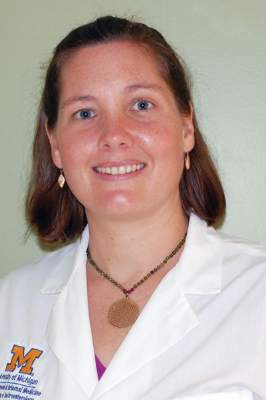User login
Physicians’ failure to screen patients for esophageal cancer rarely incites legal claims, according to a Research Letter published online September 30 in JAMA. Endoscopic screening for esophageal adenocarcinoma is recommended for patients with chronic symptoms of gastroesophageal reflux disease only if they have additional risk factors. But physician surveys indicate that many clinicians order or perform upper-GI endoscopy in symptomatic patients with no additional risk factors, out of fear of litigation for missing a cancer, said Dr. Megan A. Adams of the division of gastroenterology, University of Michigan, Ann Arbor, and her associates.
To assess the actual risk of such litigation, the investigators analyzed information from “the largest U.S. medical professional liability claims database,” which includes insurance companies that collectively cover more than two-thirds of private-practice physicians across the country. They identified 278,220 claims filed against physicians in 1985-2012, of which 761 were related to upper-GI endoscopy. Of the 268 claims that involved esophageal malignancies, 19 were filed for failure to screen a low-risk patient for esophageal cancer, and only 4 of those were paid to the claimants.
In comparison, 17 claims were filed and 8 were paid for complications arising from upper-GI endoscopies done for “questionable” indications. Thus, clinicians who perform the procedure because of fear of litigation for missing an esophageal cancer are just as likely to be sued for complications of an unnecessary endoscopy, noted Dr. Adams and her associates (JAMA 2014;312:1348-9).
“There may be legitimate reasons to screen for esophageal cancer in some [low-risk] patients, but our findings suggest that the risk of a medical professional liability claim for failing to screen is not one of them,” they noted.
Physicians’ failure to screen patients for esophageal cancer rarely incites legal claims, according to a Research Letter published online September 30 in JAMA. Endoscopic screening for esophageal adenocarcinoma is recommended for patients with chronic symptoms of gastroesophageal reflux disease only if they have additional risk factors. But physician surveys indicate that many clinicians order or perform upper-GI endoscopy in symptomatic patients with no additional risk factors, out of fear of litigation for missing a cancer, said Dr. Megan A. Adams of the division of gastroenterology, University of Michigan, Ann Arbor, and her associates.
To assess the actual risk of such litigation, the investigators analyzed information from “the largest U.S. medical professional liability claims database,” which includes insurance companies that collectively cover more than two-thirds of private-practice physicians across the country. They identified 278,220 claims filed against physicians in 1985-2012, of which 761 were related to upper-GI endoscopy. Of the 268 claims that involved esophageal malignancies, 19 were filed for failure to screen a low-risk patient for esophageal cancer, and only 4 of those were paid to the claimants.
In comparison, 17 claims were filed and 8 were paid for complications arising from upper-GI endoscopies done for “questionable” indications. Thus, clinicians who perform the procedure because of fear of litigation for missing an esophageal cancer are just as likely to be sued for complications of an unnecessary endoscopy, noted Dr. Adams and her associates (JAMA 2014;312:1348-9).
“There may be legitimate reasons to screen for esophageal cancer in some [low-risk] patients, but our findings suggest that the risk of a medical professional liability claim for failing to screen is not one of them,” they noted.
Physicians’ failure to screen patients for esophageal cancer rarely incites legal claims, according to a Research Letter published online September 30 in JAMA. Endoscopic screening for esophageal adenocarcinoma is recommended for patients with chronic symptoms of gastroesophageal reflux disease only if they have additional risk factors. But physician surveys indicate that many clinicians order or perform upper-GI endoscopy in symptomatic patients with no additional risk factors, out of fear of litigation for missing a cancer, said Dr. Megan A. Adams of the division of gastroenterology, University of Michigan, Ann Arbor, and her associates.
To assess the actual risk of such litigation, the investigators analyzed information from “the largest U.S. medical professional liability claims database,” which includes insurance companies that collectively cover more than two-thirds of private-practice physicians across the country. They identified 278,220 claims filed against physicians in 1985-2012, of which 761 were related to upper-GI endoscopy. Of the 268 claims that involved esophageal malignancies, 19 were filed for failure to screen a low-risk patient for esophageal cancer, and only 4 of those were paid to the claimants.
In comparison, 17 claims were filed and 8 were paid for complications arising from upper-GI endoscopies done for “questionable” indications. Thus, clinicians who perform the procedure because of fear of litigation for missing an esophageal cancer are just as likely to be sued for complications of an unnecessary endoscopy, noted Dr. Adams and her associates (JAMA 2014;312:1348-9).
“There may be legitimate reasons to screen for esophageal cancer in some [low-risk] patients, but our findings suggest that the risk of a medical professional liability claim for failing to screen is not one of them,” they noted.
Key clinical point: Physicians are rarely sued for failure to screen for esophageal cancer.
Major finding: Among 278,220 legal claims against physicians in 1985-2012, 19 of the 268 that involved esophageal malignancies were filed for failure to screen.
Data source: A medical professional liability claims database.
Disclosures: Dr. Adams reported having no financial disclosures.

